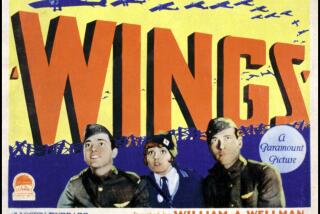Music documentaries look at the talent just beyond the spotlight
Elvis. Aretha. The Beatles. These are the titans.
Jerome Felder, Spooner Oldham and Freda Kelly? They’re the supporting players.
Following on last year’s Oscar-winning Sixto Rodriguez documentary, “Searching for Sugarman,” a fresh set of nonfiction films this year focused on low-profile talents whose stories are every bit as fascinating as their more famous compatriots.
Leading the charge this year: Oscar shortlisted documentary “20 Feet From Stardom.” Financed by the late record executive Gil Friesen, “Stardom” offers a bittersweet group portrait of half a dozen background singers who helped define landmark recordings by Ray Charles, Ike and Tina Turner, Rolling Stones, Sting and Stevie Wonder but failed to carve out comparable solo careers for themselves.
At the outset, director Morgan Neville faced a daunting challenge. He says, “My first thought was, ‘God this is going to be a really depressing documentary’ because there’s a lot of heartbreak and missed opportunities and bad luck. But as I started interviewing these women, the thing that surprised me is how indomitable they were.”
Case in point: Darlene Love, the uncredited vocalist for several girl-group hits in the 1960s, recounts in “Stardom” that she resolved to stage a comeback after hearing her “Christmas” song on the radio while cleaning a bathroom as a housemaid.
“The film’s not about achieving your dreams, it’s about what happens when you don’t,” says Neville.
TIMELINE: The Academy Awards through the years
Neville, who previously shot documentaries about Johnny Cash, Pearl Jam and Brian Wilson, points out: “Most of our culture is about celebrating the stars. You don’t get patted on the back for being a good team player. There’s a kind of resilience these women have that allows people in the audience to see themselves in these singers.”
Several other non-Oscar-bound films also look at music through various lenses.
“AKA Doc Pomus” watches Felder evolve from a polio-stricken 6-year-old into the self-named master tunesmith responsible for the Elvis Presley anthem “Viva Las Vegas” and scores of other midcentury hits. “Muscle Shoals” gets acquainted with a self-effacing group of Alabama recording session players including Oldham, who came up with the piano riff that inspired Aretha Franklin to reinvent American soul music in her own likeness. “Good Ol’ Freda” puts the camera on a quiet Liverpool typist named Freda Kelly, who ran interference for four lads called John, Paul, George and Ringo as fan club president.
“Muscle Shoals” shifts the spotlight from “Stardom’s” black background singers to a group of white players from northern Alabama. Known as the Swampers, they laid down soul-drenched backing tracks for recordings by artists including Franklin, Wilson Pickett and Etta James.
VIDEO: Highlights from the Envelope Screening Series
Describing drummer Roger Hawkins, bassist David Hood, guitarist Jimmy Johnson, keyboardist Spooner and other prodigiously gifted sidemen from the region, “Muscle Shoals” director Greg Camalier says, “They are what they appear to be in the film: humble. The Swampers could adapt to what the artist wanted and knew how to work together in a live session. They were tenacious and worked hard and didn’t let their egos get in the way.”
The star of “Good Ol’ Freda” lacked musical talent but became a key member of the Beatles’ inner circle thanks to an equally valuable asset: discretion. Documentary maker Ryan White knew Kelly socially for years before learning from a relative that she spent much of her youth hanging out with the Beatles in the backroom of manager Brian Epstein’s appliance store.
“The film’s emphasis is on the early days before the Beatles were really famous,” says White. “Freda was a fly on the wall, so she’s been able to humanize John, Paul, George and Ringo as boys rather than superstars.”
“Freda,” “Muscle Shoals” and “20 Feet From Stardom” entice with astonishing soundtracks and backstage insights about the complex ecosystem required to grow great pop music. They also serve as character studies that celebrate such modest virtues as gumption, loyalty and cooperation. Neville notes, “Making music films is like a Trojan horse experience. People come for the music, but they get something else along with it.”
More to Read
Only good movies
Get the Indie Focus newsletter, Mark Olsen's weekly guide to the world of cinema.
You may occasionally receive promotional content from the Los Angeles Times.






